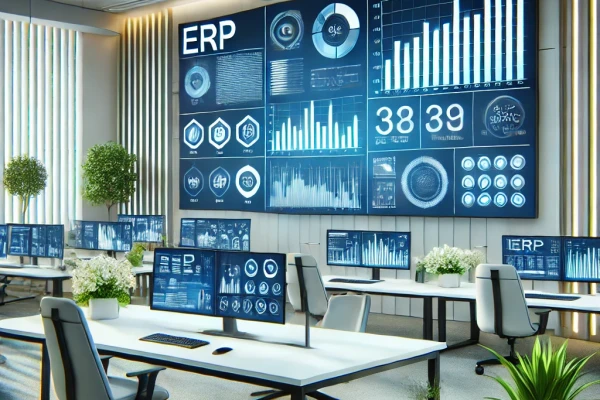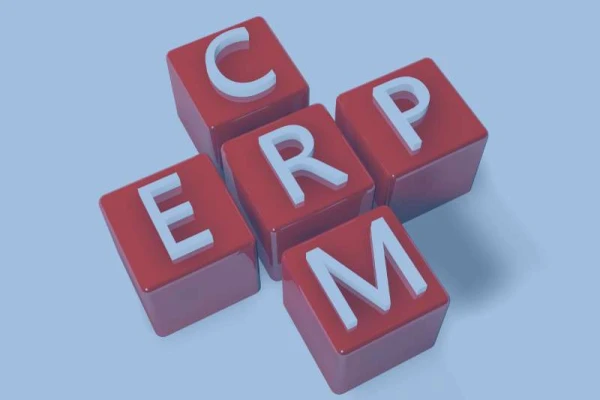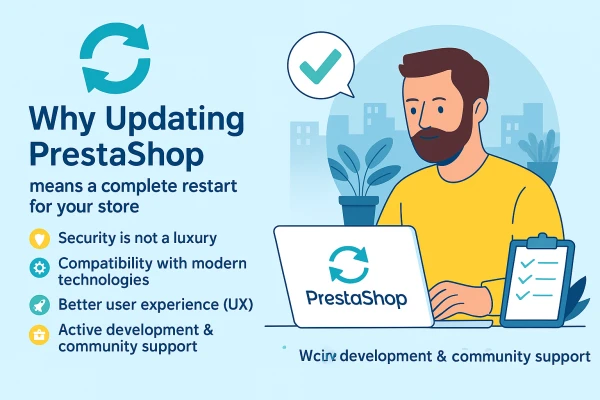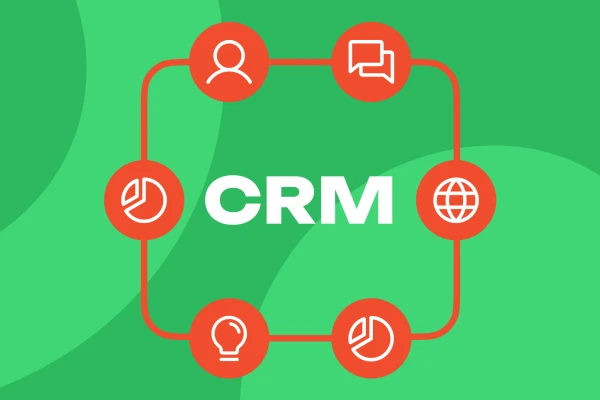ERP - Enterprise Resource Planning System
ERP integrates business processes including finance management, manufacturing, procurement, and sales to enhance efficiency.

Advantages of Using ERP
Key advantages of using ERP for businesses
✓ Centralized Data Management
ERP system allows storing all company data in a single centralized database, facilitating access to information for all departments and employees.
✓Business Process Automation
ERP enables automation of many routine operations, helping to speed up task execution and reduce the likelihood of errors.
✓ Efficiency Increase
With centralized management and automation, ERP helps increase productivity and optimize internal company processes.
✓ Cost Reduction
Using ERP can help reduce operational costs by optimizing production processes, inventory, and procurement.
✓ Improved Analytics and Reporting
ERP provides the ability to create detailed reports and data analysis, aiding in enterprise management and strategic decision-making.
✓ Easier Integration with Other Systems
Many ERP systems have the capability to easily integrate with other software products and services, allowing companies to create comprehensive IT infrastructures.
✓ Enhanced Data Security
ERP systems provide protection of confidential information and may have built-in tools for controlling access to data.
Results come automatically
Range of Possibilities
Learn how our ERP system can enhance your business
Contact Management
Automation of Sales Processes
Customer Segmentation and Personalized Approach
Monitoring and Analysis of Marketing Activities
Increased Team Productivity
Accurate Tracking of Customer Base and Interaction History
Time Saving Through Automation of Routine Tasks
Improved Sales Strategies Through Data Analysis and Forecasting
Convenient Access to Customer and Task Information
Increased Customer Satisfaction Through Personalized Service and Effective Issue Resolution
Individual Approach to Customer Profitability Evaluation
Task and Project Management
Tracking of Interaction History with Customers
Coordination of Multifaceted Customer Relationships
Centralized Sales Management
Input and Tracking of Information About Existing and Potential Customers
Task Execution Control and Receiving Reports on Customer Interaction Effectiveness
Quick Access to Any Customer Documents
Automation of Call Center and Marketing Department Work
Maintenance of Company Contact History with Customers
Customer and Market Segmentation
Integration with Social Networks for Customer Interaction
Support for Mobile Devices for Remote Work
Integration with Email and Calendars for Effective Planning
Task and Project Management
Support for Customization and Functionality Extension According to Business Specific Needs
Integration
Description of ERP integration with other systems
Collaborating with artificial intelligence systems such as image recognition systems, machine learning, and others.
Managing your company's financial activities, including tracking revenues, expenses, profits, and losses.
Integrated enterprise resource planning systems that combine financial accounting, order management, inventory tracking, HR, and other functions.
Exchanging emails for communication with clients, partners, and employees.
Using messengers such as WhatsApp, Viber, Telegram, etc., for communication with clients and colleagues.
Integration with telephony systems for call handling and call logging with clients.
Utilizing tools for conducting video conferences with clients, partners, and colleagues.
Organizing work and personal time using Google calendar events.
Using tools for planning, executing, and controlling projects.
Integration with various payment systems such as PayPal, Stripe, 2Checkout, etc.
Collecting and analyzing customer feedback to improve the quality of products and services.
Utilizing tools for analyzing and presenting data to make strategic decisions.
Connecting to other CRM systems for data exchange and collaboration with other companies.
Integration with APIs of other third-party services such as Google Maps, OpenWeatherMap, YouTube, etc.
These are just a few examples. Your system can integrate with many other services depending on your business needs.
Service Prices
Cooperation under B2B contract terms. Payment based on the invoice for the completed work.
| Service | Price |
|---|---|
| Consultation | Free |
| Project estimation | Free |
| Writing a technical task | 17 euros/hour |
| Full project development | 19 euros/hour |
| Refinement of another project | 22 euros/hour |
| Correction of others' mistakes | 22 euros/hour |
| Writing customer documentation | 17 euros/hour |
We carry out tasks of any complexity
Interaction with clients is conducted in writing via messengers or email
Questions and Answers
Frequently Asked Questions from Our Partners
The cost of implementing an ERP system based on Laravel depends on the scope of work and functional requirements. It may include development, implementation, configuration, testing, user training, and ongoing system support.
After the implementation of an ERP system based on Laravel, technical support is usually available. This includes bug fixes, user consultations, training for new employees, and the development of system functionality according to business needs.
The project implementation timelines for an ERP system based on Laravel can vary from several months to a year or more, depending on the scope of work, project complexity, and availability of ready-made solutions.
An ERP system based on Laravel may include modules such as production management, inventory control, financial accounting, order management, HR module, and others. Functional capabilities may include reporting, analytics, business process automation, and more.
Yes, an ERP system based on Laravel typically offers extensive customization capabilities, allowing it to be tailored to specific business needs. This may include changing processes, creating new modules, integrating with other systems, and more.
User training for working with a new ERP system based on Laravel may be conducted through training courses, webinars, manuals, or personal training. Training goals may include familiarization with the system interface, working with modules, and performing routine operations.
An ERP system based on Laravel can be scaled by expanding functionality, integrating with other systems, optimizing performance, and other methods. Key methods may include changes to system configuration, development of additional software, and integration with services.
Data security in an ERP system based on Laravel is typically ensured through encryption, authentication, authorization, protection against SQL injection attacks, and other measures. Regular audits and security monitoring may also be used.
Yes, an ERP system based on Laravel can support integration with other systems used by the client, such as CRM, accounting system, e-commerce, and others. Integration can be achieved through APIs, web services, or other methods.
System requirements for working with an ERP system based on Laravel may include a web server with PHP support and a database, such as MySQL or PostgreSQL. Additional PHP libraries and extensions may also be required depending on system requirements.
An ERP system based on Laravel can be deployed in various cloud services such as Amazon Web Services (AWS), Microsoft Azure, Google Cloud Platform, and others. Different plans and configurations suitable for the client's needs may be available for cloud deployment.
To find out the opinions of other clients about the implementation and use of an ERP system based on Laravel, you can read reviews on the developer's website, reviews in open sources, or directly contact other companies using this system.
After the implementation of the basic version of an ERP system based on Laravel, various additional services and modules may be available for purchase, such as advanced analytical reports, integration with external services, additional support, and more. These services may be purchased separately depending on the client's needs.
The upgrade process of an ERP system based on Laravel to new versions typically involves using the Composer package manager and deployment automation tools such as Laravel Forge or Envoyer. Updates may be released regularly to fix bugs, improve functionality, and ensure security.
<div class="container"> <h2>What is CRM?</h2> <p>CRM (Customer Relationship Management) is a system that helps businesses connect with customers and manage sales. The primary goal of CRM is to understand and improve the customer experience. With CRM systems, companies can:</p> <ul> <li><strong>Track sales and potential deals</strong> — every stage of the process is monitored to ensure no leads are missed.</li> <li><strong>Manage customer interactions</strong> — all contacts with customers are recorded: phone calls, correspondence, inquiries.</li> <li><strong>Analyze the effectiveness of marketing and sales</strong> — CRM helps understand which marketing campaigns yield the best results.</li> </ul> <div class="highlight"> <p><strong>Example:</strong> Imagine your shoe store has a customer database. With CRM, you can not only remember which models each customer ordered but also create special offers based on their preferences.</p> </div> <h2>What is ERP?</h2> <p>ERP (Enterprise Resource Planning) is a system for managing a company's internal processes. The main goal of ERP is to optimize all business processes within a company: from accounting to human resource management. ERP systems cover more aspects of a business than CRM and include modules for:</p> <ul> <li><strong>Accounting and finance</strong> — helping automate financial accounting and cost management.</li> <li><strong>Inventory and warehouse management</strong> — ERP facilitates control of stock levels, purchasing, and logistics management.</li> <li><strong>Human resources management</strong> — ERP systems have HR modules where employee data can be stored, and vacation time and performance can be tracked.</li> </ul> <div class="highlight"> <p><strong>Example:</strong> If you own a manufacturing company, ERP will help not only monitor deliveries and stocks but also track costs at every stage of production, enabling optimization of the entire supply chain.</p> </div> <h2>CRM or ERP: When to Choose Which?</h2> <p><strong>Choose CRM</strong> if your business focuses on sales and customer service. CRM is an excellent choice for retail stores, marketing agencies, and companies focused on customer experience.</p> <p><strong>Choose ERP</strong> if your company has complex internal processes, such as manufacturing or logistics. ERP helps control costs, plan resources, and enables more efficient management of supply chains.</p> <h2>How Do They Work Together?</h2> <p>Modern companies often combine CRM and ERP to achieve maximum efficiency. CRM helps attract and retain customers, while ERP handles all internal processes. Synchronizing these systems provides a comprehensive view of the process from “start to finish”: from attracting a customer to delivering the product.</p> <div class="diagram"> <h3>Interaction of CRM and ERP in Business</h3> <p>CRM → Lead Management → Sales → After-Sales Service</p> <p>ERP → Accounting → Inventory → Logistics → Delivery</p> </div> <h2>Summary</h2> <p>CRM and ERP complement each other but serve different purposes. CRM focuses on customer interactions, while ERP optimizes internal processes. Together, they form a comprehensive system that helps businesses grow more efficiently.</p> </div> <style> .container { margin: 2rem auto; padding: 20px; background-color: #ffffff; box-shadow: 0px 4px 12px rgba(0, 0, 0, 0.1); } h1, h2, h3 { color: #2c3e50; margin-top: 1.5rem; } p { margin: 1rem 0; } ul { margin: 1rem 0; padding-left: 1.5rem; } li { margin-bottom: 0.5rem; } .highlight { background-color: #eef9ff; border-left: 5px solid #3498db; padding: 1rem; margin: 1rem 0; } .diagram { text-align: center; padding: 1rem; background-color: #f1f1f1; margin: 1rem 0; border-radius: 8px; } .diagram p { font-style: italic; color: #7f8c8d; font-size: 1.5rem; } footer { margin-top: 2rem; text-align: center; color: #95a5a6; font-size: 0.9rem; } </style>
News
Welcome to explore our interesting and useful publications that will tell you about the latest events and interesting facts!
Effective management is a key factor for the success of modern businesses.
Enterprise resource planning (ERP) systems based on Laravel provide companies with powerful tools for storing, processing, and analyzing large volumes of data. They help automate business processes, which enhances efficiency and improves customer collaboration. Laravel ERP ensures quick access to information, simplifies customer database management, and allows data analysis for informed decision-making.
One of the key advantages of Laravel ERP is secure data storage and structuring. Integration with other Laravel-based solutions enables the creation of a comprehensive management system that meets the needs of modern businesses. Using Laravel-based ERP helps companies optimize business processes, increase productivity, and achieve strategic goals, creating competitiveness in the market.




Interacting with popular social media platforms such as Facebook, Twitter, LinkedIn, etc., for marketing purposes and audience engagement.